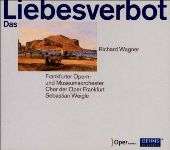|
Back
09/10/2013
Richard Wagner: Das Liebesverbot
Christiane Libor (Isabella), Michael Nagy (Friedrich), Anna Gabler (Marianna), Peter Bronder (Luzio), Charles Reid (Claudio), Thorsten Grümbel (Brighella), Anna Ryberg (Dorella), Simon Bode (Antonio), Franz Mayer (Angelo), Kihwan Sim (Danieli), Julian Prégardien (Pontio Pilato), Frankfurt Opera and Museum's Orchestra and Choir, Sebastian Weigle (conductor), Matthias Köhler (choir master)
Concert performances recorded at the Alte Oper, Frankfurt (May 2 and 4, 2012) – 148’30
Oehms Classics OC 942 – Notes in German and English – Libretto in German

   
The opening bars of the overture on this recording are absolutely electrifying and thus make a terrific introduction to a work that has obviously been thoroughly prepared for the concert performances that provide the material.
At the age of 21 Richard Wagner composed this work within a three-month span. He was inspired by the general theme of sexual hypocrisy that permeates Shakespeare’s Measure for Measure and what he experienced in contemporary Germany. The full title of the opera is Das Liebesverbot, oder der Noviz von Palermo (“The Ban on Love, or the Novice of Palermo. The novice is Isabella who must intercede with the puritanical governor, Friedrich, to save the life of her brother, Claudio, who is sentenced to death for impregnating his fiancée. Friedrich agrees to spare the brother, but only if Isabella will sleep with him. This is just the beginning of the complications that arise. The young Wagner made drastic changes to Shakespeare’s play (it is termed a “problem play” which basically means it doesn’t really work), notably reducing the tiresome lead role to a silent walk-on at the finale. He also cut several characters, but added one of his own, the bizarrely name Pontio Pilato, the manager of a bar. He also changed the venue from Vienna to Palermo, where what he termed the “free sensuality” of the Sicilians is being suppressed by a prudish German governor. He thus used the work to take cheeky potshots at the mores of the day.
Frankfurt Opera assembled an eminently suitable cast for the work. The four tenors (Peter Bronder, Charles Reid, Franz Meyer and Julian Prégardien) are well differentiated as are the three soprano voices(Christiane Libor, Anna Gabler and Anna Ryberg). If Michael Nagy in the bass-baritone role of Friedrich makes his fine voice sound more dignified than pompous he gets his comeuppance when tricked into having sex with...his own wife! Christiane Libor, who has sung both Sieglinde and Brunnhilde, is a staunch, expressive Isabella, a heroine who is supposedly a paragon of virginal virtue, but resorts to her own set of subterfuges and ends up marrying the dissolute friend of her dissolute brother.
One of the most startling passages in the work comes at the beginning of Act I, Scene two, when we are introduced to Isabella in her cloister. Nuns sing a Salve Regina to music used eight years and three operas later in Tannhäuser, and there is also a pre-echo of Parsifal, almost 50 years in the future. Not only did Wagner later use musical motifs from this work, but the big issue of sacred vs profane love permeated his oeuvre. (Another telling point: Wagner specifies a cloister of “Elisabeth”, presumably Saint Elisabeth of Hungary; this is not mentioned in Shakespeare, but can be seen as another pre-echo of Tannhäuser.)
Wagner later dismissed the work as being too influenced by Italian and French models. What comes clear, though, is much influence from Beethoven’s Fidelio, with hints also from Weber’s Der Freischütz. Far from abandoning the work after its unsuccessful premiere in 1834, for a time he shopped the work around to various opera houses and even started preparing a French version for Paris.
Sebastian Weigle and his Frankfurt company have already released their performance of Wagner’s first opera, Die Feen and upcoming is a recording of Rienzi. Of the three, Das Liebesverbot gives more than a few clear indications as to what the mature Wagner would eventually produce. Wagnerites will find much of interest here.
The recording’s only rival might be Wolfgang Sawallisch’s from 1995, recently re-released (along with Die Feen and Rienzi) on the Orfeo label. The recording from 1962 under Robert Heger is just two hours in length, so is obviously severely cut.
A big drawback, however, is the absence of a translation of the libretto. This doesn’t matter so much with a release of a frequently-recorded opera, but it is a pity in the case of a work that deserves to be more widely known and understood. (A libretto in German is available online. I tried using Google’s translation tool, but a language I can only call Gernglish emerged.) The opera is stage-worthy, and is certainly a lot more fun than the Shakespeare play.
For a review of the largely successful 2008 Glimmerglass production of Das Liebesverbot, still the only full staging the work has had in North America, click here.
Michael Johnson
|